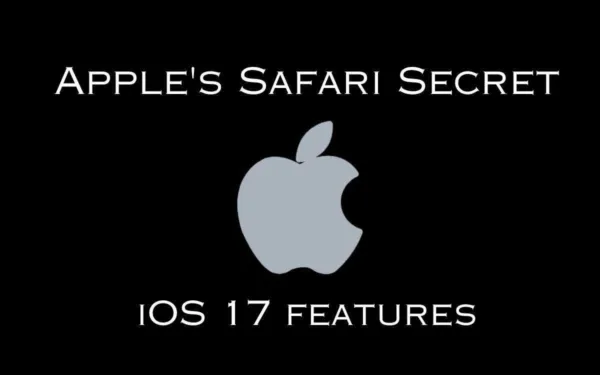Surprise Revelation: Apple’s Safari Secret
Amidst the courtroom drama of the Department of Justice (DOJ) versus Google antitrust trial, a moment of revelation unfolded.
John Giannandrea, the luminary Apple executive overseeing Machine Learning and AI, unveiled an astonishing secret hidden within Safari, Apple’s celebrated web browser.
This clandestine feature carries the potential to challenge Google’s longstanding supremacy in the realm of search engines.
In this captivating article, we embark on a journey through the intricacies of this groundbreaking revelation.
Together, we’ll explore the far-reaching implications it holds for users worldwide, as the digital landscape stands poised on the brink of change.
Apple’s Role in the Google Antitrust Trial
The courtroom revelation that sent shockwaves through the tech world, Apple took center stage in the Department of Justice’s (DOJ) antitrust suit against Google.
While not a defendant, Apple’s involvement is far from peripheral, thanks to its colossal partnership with the search giant.
As reported by Bloomberg, Google annually funnels a staggering $4 billion to $7 billion into Apple’s coffers, securing its status as the default search engine on iPhones.
This colossal financial nexus underscores the significance of Apple’s senior vice president of Machine Learning and AI, John Giannandrea’s, testimony.
This is a pivotal moment where tech giants’ battles for dominance are laid bare for all to see.
The Secret Second Search Engine Setting
John Giannandrea, Apple’s senior vice president of Machine Learning and AI, unveiled a game-changing feature in iOS 17 during his testimony.
This newfound capability empowers iPhone users to break free from the Google search monopoly.
With iOS 17, you can now customize your Safari browser by selecting from a range of search engines for both your regular and private browsing modes.
Astonishingly, Google maintains its default status for both settings, but the key takeaway here is the power it grants users – the freedom to choose their preferred search engine, ushering in a new era of browsing flexibility.
Changing Your Default Search Engine
To change your default search engine from Google, follow these effortless steps on your iPhone.
Step 1: Go to Settings on your iPhone.
Step 2: Scroll down and select Safari.
Step 3: Under the Search heading, you’ll find two options: Search Engine and Private Search Engine.
Step 4: Tap on Search Engine to choose from a list of alternatives, including Google, Yahoo, Bing, DuckDuckGo, and Ecosia.
Step 5: For private browsing, tap on Private Search Engine, where you’ll find the same list of search engines.
With this remarkable feature, browser interaction evolves.
Users gain the power to select a secondary search engine tailored for private browsing, granting them newfound freedom and customization in their online experiences.
In contrast to this function, previously users could only select one search engine for both modes.
A Potential Challenge for Google
During his testimony, DuckDuckGo CEO Gabriel Weinberg raised pertinent concerns about Google’s stronghold as the default search engine on numerous mobile browsers.
He contended that this dominant status served as a significant barrier, deterring users from transitioning to alternatives.
Weinberg asserted that the switching process involved excessive complexity and steps, potentially hampering user motivation.
However, the situation on the iPhone presents a contrasting picture.
Here, the process of changing the default search engine appears notably straightforward, leaving us to ponder whether Weinberg’s argument holds universally.
The genuine challenge faced by Weinberg and other alternative search engines, such as DuckDuckGo, lies in persuading users to make the leap away from Google, emphasizing not just the ease of change but also the value and privacy benefits they offer.
Conclusion
Apple’s disclosure of a concealed secondary search engine feature within Safari via iOS 17 is sending ripples through the search engine landscape.
This revelation heralds the possibility of shaking up the search engine market, offering users a richer tapestry of options for crafting their browsing journeys.
While Google maintains its stronghold as the default search engine, this newfound flexibility empowers users to dabble in alternatives.
As the Google antitrust trial continues, the ramifications of this revelation are poised to reshape the competitive terrain of the tech industry.
The unfolding legal proceedings will shed light on whether this development signals a shift in the balance of power within the digital realm, where choice and control now lie more firmly in the hands of the users.






